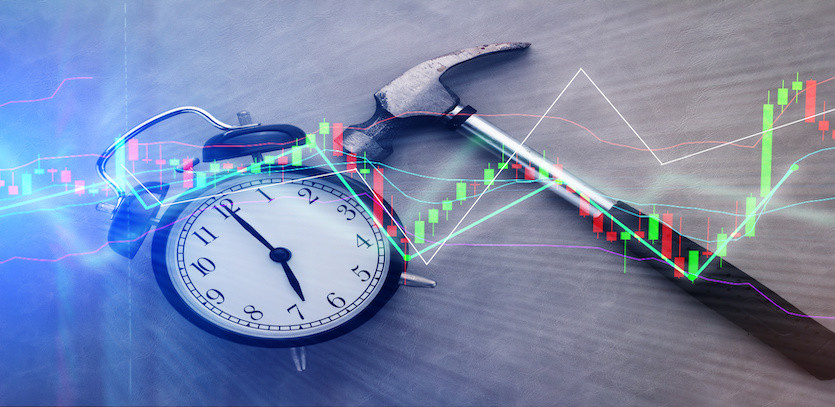The Eternal Maxim of Wall Street
The timeless adage from Wall Street rings true: "It's not a loss until you sell." This principle underlines the fact that the fluctuating value of your investments doesn't truly matter until you decide to cash in. So, it's generally advisable not to obsess over daily market gyrations. However, this notion may provide little solace during a stock market crash when your portfolio plunges by 20% or more. We saw this scenario unfold recently, or you might recall the early stages of the Covid-19 pandemic.
Market downturns are unavoidable, and they sting. But how should you react when the market crashes? Turn it to your advantage - here's how.
Embrace Inactivity During a Market Crash
If you have faith in your investment approach and the assets in your current portfolio, resist altering your course unless there's a compelling reason. When you constructed your portfolio, you probably considered the possibility of a market crash like the current one.
Those who react impulsively and sell off their holdings during a crisis often rue their decisions. Consider the investors who panicked and sold in the spring of 2020, when the S&P 500 dipped by over 30% in a short time. By summer 2020, when the early losses from Covid had been reversed by a quick rally, these investors were already lamenting their hasty decisions. By the close of the year, they had missed out on 65% gains from the crash's nadir.
Treat a Market Crash Like a Shopping Spree
Often, market crashes are triggered by events such as the outbreak of Covid-19 or announcements from the Federal Reserve regarding changes to monetary policy. These events can spark aggressive sell-offs by speculative traders who borrowed money to invest and are now compelled to sell to meet margin calls, causing a domino effect of selling.
However, a market crash can also open doors, particularly for astute investors. This could be an opportunity to snap up stocks and funds you've been eyeing at greatly reduced prices, or you might simply continue your regular investment schedule.
For newcomers to investing, index funds are an excellent starting point, according to Paul Miller, a certified public accountant (CPA) based in New York. He advises, “Acquire them consistently, on a regular schedule. Then sleep soundly at night.”
Persist with Dollar-Cost Averaging, Despite the Downturn
Amid market chaos, the most prudent approach to shopping for stocks is to employ a dollar-cost averaging strategy. This involves investing a fixed amount at consistent intervals, even during frightening market conditions.
Dollar-cost averaging can even out the highs and lows of your average purchase price, often reducing it over time. Spreading your investments in this way mitigates risk, as you won't be putting all your eggs in one basket at a specific market price. This method should hopefully alleviate the fear of "What if the stock plummets tomorrow?"
Dollar-cost averaging is an automatic feature of most workplace retirement plans. If you're investing independently, in a taxable investment account or an individual retirement account (IRA), most brokerages offer a feature that allows you to automate your contributions.
Seek Out Dividends Amid a Market Crash
For the slightly more venturesome investor, a down market can be an opportune time to focus on dividends when making investment choices. Many companies distribute a portion of their profits to shareholders as an annual dividend yield, comparable to the interest banks pay to savings account holders.
Though dividends aren't guaranteed and can fluctuate, companies that offer dividends tend to be more established, and their share prices are less volatile. Provided the dividend is paid, you're guaranteed some returns. Hence, dividend investing can be a wise strategy during market crashes when share prices and returns might otherwise decline.
Consider the Sector Rotation Strategy
One long-standing approach to navigating market downturns is shifting investments from one market sector to another. For instance, during periods of significant growth, tech stocks often perform well. Conversely, during economic slowdowns, "unexciting" sectors like utilities tend to hold their own. Therefore, by strategically transitioning from one sector to another, you might avoid substantial dips in a particular sector.
However, this strategy, known as sector rotation, isn't universally admired.
Desmond Henry, a certified financial planner (CFP) based in Kansas, expresses his skepticism, “I'm not a fan of sector rotation. It's another form of market timing. You have to time when to enter and exit. I remember when all those stay-at-home stocks became a big deal, but by the time that trend was widely recognized, it was too late. And even if you time the entry right, when do you exit?”
You can sidestep this challenge and maintain solid returns by investing in diversified index funds, which could perform well regardless of how individual sectors are faring. Owning a portion of the entire market ensures you're well-positioned to capitalize on growth in any sector, which can counterbalance underperformance in other sectors in the short term. See our list of the best total stock market index funds for more ideas.
Explore Bond Investment During a Market Crash
A down market can provide an opportunity for investors to look at an area that's often overlooked by beginners: bond investment.
Government bonds are widely regarded as the safest investment, even though their returns typically pale in comparison to stocks and other bonds. However, during times of uncertainty, holding government bonds can provide peace of mind due to their impeccable repayment record.
Buying government bonds generally requires a broker, which can be costly and complicated for many individual investors. However, many retirement and investment accounts offer bond funds that include various denominations of government bonds.
It's important to remember, though, that not all bond funds consist solely of safe government bonds. Some also include corporate bonds, which carry more risk.
Accept Your Losses During a Crash (and Save on Taxes)
Despite the advice given thus far, sometimes it's smart to accept your losses.
Not only does this free up funds for other investments, but if you're investing in a taxable account, it also allows you to report your losses on your taxes. This strategy, known as tax-loss harvesting, lets you offset income with realized losses, potentially reducing your tax bill.
It's advisable to consult a tax professional before implementing this strategy to ensure you avoid a wash sale, which occurs if you buy an investment that's too similar to one you sold at a loss. Alternatively, consider using a robo-advisor to manage your investments. The best robo-advisors offer built-in tax-loss harvesting features.
Approach a Market Crash with Caution if Retirement is on the Horizon
For investors nearing retirement, a stock market crash can be daunting. It's disheartening to begin withdrawing from your retirement savings during a bear market.
However, careful retirement planning can help mitigate the impact and stress of a market downturn. As you age, you should ideally be transitioning from aggressive investments to more conservative, bond-based holdings to preserve your savings.
You might also consider using a "bucket strategy" that keeps a few years' worth of living expenses in cash, providing a buffer against severe market dips.
Maintaining some of your retirement savings invested allows you to benefit from future market recovery and growth. This is valuable for all long-term investors, including those already in retirement.
Indeed, you can continue to be a long-term investor during your retirement. If you're in your mid-60s, you could potentially benefit from investment growth for another two or three decades. This is particularly crucial for those who are not on solid financial ground, as it can help mitigate future shortfalls.
If retirement is still years or even decades away, start planning now on how to adjust your asset allocation as you age. This way, you'll be prepared regardless of what the market throws at you. And if you're closer to retirement without any funds set aside before a market crash, don't despair. Arrange a meeting with a financial advisor to discuss all your options.





